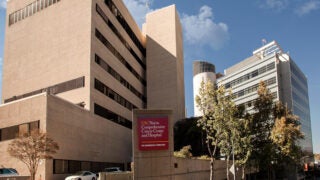USC filmmaker takes on a cultural taboo
As a 19-year-old refugee from Ethiopia, Tadious Odissu ’08, MFA ’12 was very specific when officials at a Turkish refugee camp questioned him about future plans. Odissu astonished them by saying he wanted to go to film school in California.
It may have been a result of his audacity, but in 2004 the camp officials decided to at least get him to America — specifically to a sponsor in Illinois. There, the young man’s determination so touched his sponsor that instead of making the refugee do what the sponsoring organization had mapped out for him — living in a group home with Somalian refugees and working at McDonald’s — the sponsor bought him a one-way plane ticket to Los Angeles.
Odissu, who knew no one here, made his way to Little Ethiopia on Fairfax Avenue, struck up some friendships and started a two-year odyssey that led to USC. He took classes at Santa Monica College and worked as many as three jobs on the side. For eight months, he saved on rent by working nights in a cashier’s booth at a gas station in a rough South Central neighborhood and showered and napped at school between classes and other jobs.
He was turned down three times by USC, but, undeterred, he kept applying and eventually was accepted to the USC School of Dramatic Arts. Odissu worked 40 to 60 hours a week at various jobs as a student, graduated in 2008 and was promptly accepted for graduate school at the USC School of Cinematic Arts. He received his master’s in film production in spring 2012 and spent the next year as an intern at the production company of Robert Zemeckis ’73.
Which brings Odissu to his latest quest. He is trying to raise funds through Kickstarter to finance What to Bring to America, a full-length narrative film about female genital mutilation currently taking place in immigrant communities in the United States. The project is an expansion of a 12-minute film he developed at USC for a production class featuring a competitive process that gives the green light to three film projects for funding. Odissu’s film was one of the three to receive funding, was shown at the school’s First Look showcase, won awards at various film festivals around the world and was broadcast last year on NBC Italia.
As human rights campaigns have focused on the issue of female genital mutilation in Asia, Africa, Indonesia and the Middle East, there has been a growing awareness that the practice is also taking place in immigrant populations in the West. In America, the mutilations have been a federal crime since 1997, so the practice is deeply hidden.
Odissu initially wanted to make a documentary on the topic, but found the Ethiopian community reluctant to talk about female genital mutilation on camera. For his short film, which was a narrative dramatization, he wasn’t able to persuade any Ethiopian actors to appear so opted to use South African and Haitian actors. Odissu, who has met young Ethiopian women who’ve been victims of the practice in the United States, said his script is based on their reality. He also has come to believe that presenting the issue as part of a family drama is more effective than taking a documentary approach.
“People can more easily relate to a story than the facts and figures of yet another of our million problems,” he said. “If you do it right as a storyteller, people can understand the health and cultural issues this raises.”
Odissu said he is fully committed to do his part to end the mutilations.
“I believe it is time the younger generation steps up to help end this backward tradition,” he said.
The filmmaker’s Kickstarter goal is to raise $50,000 by June 11. As the deadline approaches, he plans to tap students who worked on his short film for a bit of help. Odissu, whose USC crew included students from China, South Africa, France, Canada, Ghana, England, Ukraine, Haiti and Vietnam, said he thinks the international students were attracted to the project because his film is about adjusting to life in Los Angeles — something they all had in common.



